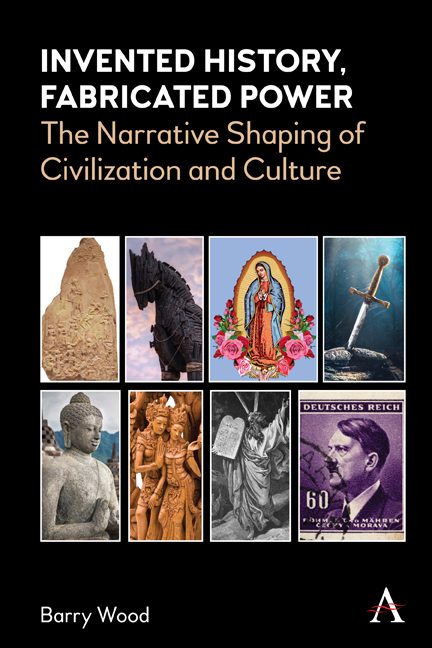Book contents
- Frontmatter
- Dedication
- Contents
- Acknowledgments
- About the Cover
- List of Abbreviations
- Introduction
- Prologue: The Prehistory of Power: Souls Spirits, Deities
- Part One Kings and Emperors
- 1 Divine Kingship in Mesopotamia
- 2 Pharaohs among the Indestructibles
- 3 Kingship among the Hebrews
- 4 The Deification of Roman Emperors
- 5 The Deva-Rajas in India and Southeast Asia
- 6 The Chinese Mandate from Heaven
- 7 The Japanese Imperial Cult
- Part Two Empires before the Common Era
- 8 The Legendary Empire of the Sumerians
- 9 Legendary Empires of Preclassical Greece
- 10 Patriarchs, Exodus, and the Epic of Israel
- 11 Legendary Empires of Ancient India
- 12 The Legendary Founding of Rome
- Part Three Founders
- 13 Moses: The Israelite Lawgiver
- 14 Buddha and Legends of Previous Buddhas
- 15 The Savior Narratives
- 16 Muhammad, the Qur’an, and Islam
- 17 The Virgin Mary through the Centuries
- 18 Tonantzin and Our Lady of Guadalupe
- Part Four Empires of the Common Era
- 19 Narrative Inventions of the Holy Roman Empire
- 20 The Epic of Kings, Alexander the Great, and the Malacca Sultinate
- 21 The Franks, Charlemagne, and the Chansons de Geste
- 22 The Legendary Kingdom of King Arthur
- 23 Ethiopian Kings and the Ark of the Covenant
- 24 Narratives of the Virgin Queen
- Part Five Ideologies
- 25 Discovery: The European Narrative of Power
- 26 Epics of the Portuguese Seaborne Empire
- 27 Dekanawida and the Iroquois League
- 28 The New England Canaan of the Puritans
- 29 The Marxist Classless Society
- 30 Adolph Hitler: Narratives of Aryans and Jews
- Epilogue: A Clash of Narratives
- Bibliography
- Index
- About the Author
28 - The New England Canaan of the Puritans
Published online by Cambridge University Press: 15 December 2020
- Frontmatter
- Dedication
- Contents
- Acknowledgments
- About the Cover
- List of Abbreviations
- Introduction
- Prologue: The Prehistory of Power: Souls Spirits, Deities
- Part One Kings and Emperors
- 1 Divine Kingship in Mesopotamia
- 2 Pharaohs among the Indestructibles
- 3 Kingship among the Hebrews
- 4 The Deification of Roman Emperors
- 5 The Deva-Rajas in India and Southeast Asia
- 6 The Chinese Mandate from Heaven
- 7 The Japanese Imperial Cult
- Part Two Empires before the Common Era
- 8 The Legendary Empire of the Sumerians
- 9 Legendary Empires of Preclassical Greece
- 10 Patriarchs, Exodus, and the Epic of Israel
- 11 Legendary Empires of Ancient India
- 12 The Legendary Founding of Rome
- Part Three Founders
- 13 Moses: The Israelite Lawgiver
- 14 Buddha and Legends of Previous Buddhas
- 15 The Savior Narratives
- 16 Muhammad, the Qur’an, and Islam
- 17 The Virgin Mary through the Centuries
- 18 Tonantzin and Our Lady of Guadalupe
- Part Four Empires of the Common Era
- 19 Narrative Inventions of the Holy Roman Empire
- 20 The Epic of Kings, Alexander the Great, and the Malacca Sultinate
- 21 The Franks, Charlemagne, and the Chansons de Geste
- 22 The Legendary Kingdom of King Arthur
- 23 Ethiopian Kings and the Ark of the Covenant
- 24 Narratives of the Virgin Queen
- Part Five Ideologies
- 25 Discovery: The European Narrative of Power
- 26 Epics of the Portuguese Seaborne Empire
- 27 Dekanawida and the Iroquois League
- 28 The New England Canaan of the Puritans
- 29 The Marxist Classless Society
- 30 Adolph Hitler: Narratives of Aryans and Jews
- Epilogue: A Clash of Narratives
- Bibliography
- Index
- About the Author
Summary
In September 1620 the Mayflower departed from Southern England bearing approximately 70 Separatists bound for the New World. They carried a charter authorizing the founding of a colony on the coast of Virginia that carried with it the assumption by both the English monarch and the pilgrims that they were entitled to settle there. As we have seen the background of this assumption was the doctrine of discovery which had spread from Roman Catholic nations of southern Europe to the primarily Protestant nations of the north. A hasty and unwise departure from England in August subjected them to inclement weather. Consequently they arrived in November far to the north with winter storms ruling out the planned landfall on the Virginia coast, and as historian Samuel Eliot Morison noted, the patent they brought with them was now invalid (1952, 75, n. 1). If the coastal tribes of Native Americans had equated land occupancy with ownership, they might well have regarded all charters issued in England as invalid, but ownership was a European concept with no Native American equivalent.
After several days of exploration in what is now Cape Cod Bay, these Separatists created their own “Civic Body Politic” in the Mayflower Compact (Morison 1952, 75–76), then landed on the coast to establish the first permanent English colony in the New World, which they named Plimouth after their English port of departure. A decade later, the Arabella landed to the north at Massachusetts Bay bearing the first load of Puritans with a settlement charter. They were followed by thousands, more than 40,000 by 1641. Over the following decades, they established settlements across most of Eastern Massachusetts. These colonizing events were not unlike those by Europeans in Africa, Asia, South America, and Australia through the fifteenth to the nineteenth centuries, but the Separatists and Puritans developed a unique self-aggrandizing narrative that, over the rest of the seventeenth century, was progressively enhanced. Its central themes raised these colonists to God-directed heroes not seen since biblical times.
Their motivations for leaving England were several, though most were to escape from religious conflict.
- Type
- Chapter
- Information
- Invented History, Fabricated PowerThe Narratives Shaping Civilization and Culture, pp. 315 - 326Publisher: Anthem PressPrint publication year: 2020



